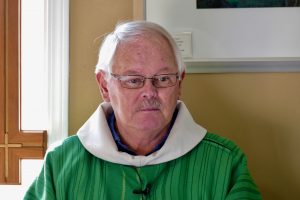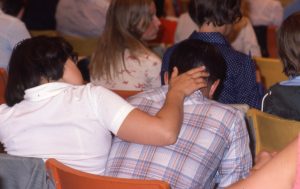Learning To Forgive
(Sirach 27:30-28:7; Psalm 103; Romans 14:7-9; Matthew 18:21-25)
******************************************************************
What would happen if God treated us the way we think we deserve to be treated?
Forgiveness is the core of following Jesus.
The gospel today is a lesson on the meaning of forgiveness. Jesus’ reply can mean seventy times seven, or seventy-seven times. Either way, it means an unlimited number, a perfect number. It is Jesus’ reversal of the cry for excessive seventy-seven-fold vengeance by Lamech in Gen 4:23. To illustrate the point, Jesus tells a parable.
The amount is 60 million (or billions of dollars), a deliberately fantastic sum. The servant’s situation is hopeless – his whole existence is dissolving before his eyes. There is no way to pay the infinite amount owed. To sin is an infinite offense against an infinitely great God, an offense we cannot possibly undo by ourselves. Nothing others can do to us compares in any way with what we have all already done to God, and if God has forgiven us the debt we owe to him, then we must forgive others the debts they owe to us. The debt is infinite – there is no point postponing payment, so with a sovereign act of grace, the king wipes out the debt.
However, manhandling his social equal, the servant hears and ignores the same, word for word plea he had used. He is denounced because he has mishandled forgiveness, not the money. Anyone who has been forgiven has an obligation to forgive. As punishment, the wicked servant is treated as he treated others; because the debt is infinite, the punishment is eternal.
We cannot earn God’s forgiveness, but we can lose it by hoarding it. Forgiveness can be revoked at the last judgment if it was not shared with others. A person who does not forgive others shows that he has not really experienced God’s forgiveness; otherwise, it would flow to others. God’s forgiven children must show their resemblance to their Father by forgiving like Him, from the heart, out of compassion. Here Jesus reveals who God really is, total and unconditional forgiveness. Forgiveness is not something God does but who God is. To follow Jesus means that we also must become like him, total forgiveness.

Fr. Ron Rolheiser OMI presiding at the closing Eucharist of the retreat he conducted at the Star of the North this past weekend.
Noted Oblate theologian and speaker, Ron Rolheiser, defines forgiveness as the transformation of negative energy into pure love. We take in negative energy and instead of responding in kind, which is the way of the world, we hold it, pray about it, share our pain with others, and then ideally, we give it back to the one who hurt us, with love. That is, without revenge, punishment, name-calling or trying to get even in any way. It is this love, and only this kind of love that Jesus showed us on the cross, that can break the cycle of violence that grips most of this world.
Last Sunday’s gospel, in which Jesus gives us a formula on how to forgive, is a prelude to this one. We are to go to the one who hurt us, alone, and instead of striking back or trying to bury the hurt, we share our hurt feelings with the other, let them go and move on. It is so simple, yet so powerful. Why not try it, and set ourselves free from anger and resentment? After all, the one who carried the hurt is the one who is hurting!
In acting this way, we love ourselves by validating our hurt and not allowing others to walk over us. We love our enemies by responding with love instead of reacting; we begin the process of healing by letting go of the pain, and we open the door to possible reconciliation.

Leonard, on a weekend pass from a rehabilitation centre for alcohol and drug abuse, booked a hotel room for him and his wife, and talked with her until 4 am. He started with the old patterns of blaming and resentment about her past, dumping on her. She felt like leaving, as her counsellors had told her if he tried to control again, but decided to practice “Communicating with love” first, a skill she had learned from her pastor. She opened up and shared her feelings about what he was doing. For the first time in their relationship, he was able to hear what she was saying, became aware of what he was doing, and made a change – he started to open up, shared what he was experiencing with her, stopped dumping on her and became more sensitive to her feelings. This, she later recounted to her pastor, was a turning point for them both in their relationship, and in his recovery.
The Eucharist that we celebrate today is a powerful experience of God accepting us as we are, forgiving us and healing us once again. Our response is to let that love and knowledge transform us into a forgiving community, able to do the impossible, to forgive, through the power of the Spirit within us.
So remember, forgiveness is the core of following Jesus. Let us learn to forgive, and be ambassadors of reconciliation to the world.




1. Willing to Forgive others as you forgive yourself, no matter how wrong they are.
2. Having unconditional love, totally surrender yourself to God and Jesus Christ.
3. Be open to others to have an open relationship; try to have a positive attitude and behaviour.
4. Try to love like have an intimate and understanding relationship with God and Give that friend a hug or give that person a hug.
5. Pray for people who are suffering, sick and ill for the rest of their lives.